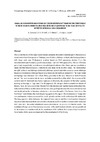Identificador persistente para citar o vincular este elemento:
https://accedacris.ulpgc.es/jspui/handle/10553/19922
| Título: | Parallel gigantism and complex colonization patterns in the Cape Verde scincid lizards Mabuya and Macroscincus (Reptilia: Scincidae) revealed by mitochondrial DNA sequences | Autores/as: | Carranza, Salvador Arnold, E. N. Mateo, José Antonio López-Jurado, L. F. |
Clasificación UNESCO: | 24 Ciencias de la vida 2401 Biología animal (zoología) 2416 Paleontología 240116 Herpetología |
Palabras clave: | Maximum-Likelihood Lacertidae Biogeography Congruence Specimens, et al. |
Fecha de publicación: | 2001 | Publicación seriada: | Proceedings of the Royal Society B: Biological Sciences | Resumen: | The scincid lizards of the Cape Verde islands comprise the extinct endemic giant Macroscincus coctei and at least five species of Mabuya, one of which, Mabuya vaillanti, also had populations with large body size. Phylogenetic analysis based on DNA sequences derived from the mitochondrial cytochrome b, cytochrome oxidase I and 12S rRNA genes (711, 498 and 378 base pairs (bp), respectively) corroborates morphological evidence that these species constitute a clade and that Macroscincus is unrelated to very large skinks in other areas. The relationships are ((M. vaillanti and Mabuya delalandii) (Mabuya spinalis and Macroscincus coctei (Mabuya fogoensis nicolauensis (Mabuya fogoensis antaoensis and Mabuya stangeri)))).</p> | URI: | https://accedacris.ulpgc.es/handle/10553/19922 | ISSN: | 0962-8452 | DOI: | 10.1098/rspb.2001.1699 | Fuente: | Proceedings of the Royal Society B: Biological Sciences[ISSN 0962-8452],v. 268, p. 1595-1603 |
| Colección: | Artículos |
Citas SCOPUSTM
48
actualizado el 08-jun-2025
Citas de WEB OF SCIENCETM
Citations
43
actualizado el 18-ene-2026
Visitas
164
actualizado el 15-ene-2026
Descargas
192
actualizado el 15-ene-2026
Google ScholarTM
Verifica
Altmetric
Comparte
Exporta metadatos
Los elementos en ULPGC accedaCRIS están protegidos por derechos de autor con todos los derechos reservados, a menos que se indique lo contrario.
